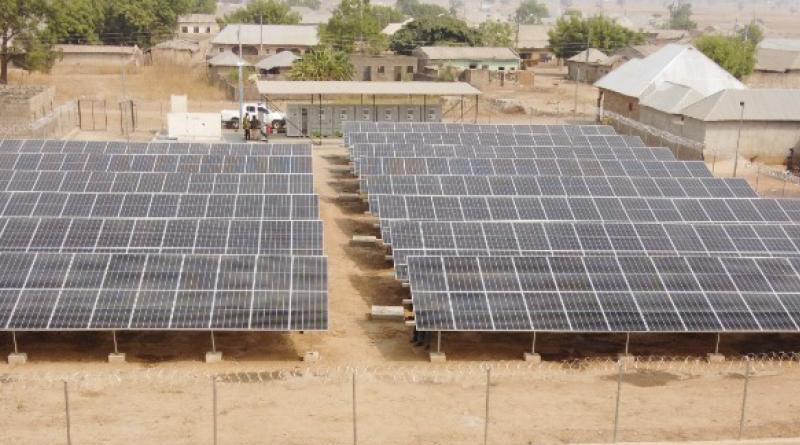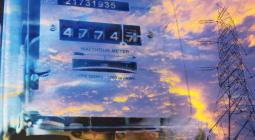Nigerian minigrids improve power reliability and utility revenues for communities “under” the grid

The town of Toto in the central Nigerian state of Nasarawa, near the national capital of Abuja, is wired for electricity. Though poles and wires dot the landscape, people live without power.
Toto is connected to the country’s main grid, and it has a local distribution system built years ago to provide electricity to the community. But that infrastructure is now in shambles, disfigured by chronic lack of maintenance and widespread “tapping” or electricity theft. According to John Ufeoshi, the Lagos-based business and project development lead for interconnected minigrids at PowerGen Renewable Energy, the existing distribution system is useless and needs to be rebuilt entirely.
Toto is like many African communities that nominally have electricity access, but the quality is poor or non-existent. In a 2018 report on the potential for minigrids in Nigeria, the Rocky Mountain Institute (RMI) estimated 200 million “undergrid” households worldwide. That’s almost as many people as those with no access to electricity at all. People living in these grid-connected communities, or undergrid, often struggle with unpredictable blackouts, power rationing, affordability or lack of any power at all, according to the RMI report.
PowerGen and Abuja Electricity Distribution Company negotiate a minigrid and grid power-sharing agreement
In what John Ufeoshi calls a “win-win-win” arrangement, microgrid developer PowerGen is building a minigrid for Toto that will supply reliable power during the daytime, while the “DisCo,” the term used for electricity distribution companies in Nigeria, will deliver grid electricity at night. According to Ufeoshi, through this collaboration, the community will have access to reliable power, the utility will have a new influx of revenues, and PowerGen will benefit financially from its operations and maintenance of the solar PV generation and newly installed distribution systems. He explained that PowerGen’s financial benefit would come from managing the customer connections during the project’s tenure.
Founded in Nairobi as a developer of off-grid systems, this is PowerGen’s first time building a microgrid for a grid-connected community. PowerGen hopes the arrangement — with PowerGen selling renewable power to the town during the day and buying electricity from the Abuja DisCo at night — will establish a positive precedent.
“This is a really good fit,” Ufeoshi said, “because PowerGen has experience managing customers at the grid edge, while the Abuja Electricity DisCo is more suited to urban environments.” PowerGen will install smart meters that make revenue collection more efficient and enable remote monitoring via controls and sophisticated information technology infrastructure. Together, these new technologies should cut down on theft and vandalism while ushering in new economic opportunities for the town.
Commissioning is planned for August 2022
PowerGen microgrid engineer Elisha Chesir used HOMER Pro to create simulations of the new system, determine optimal solar and battery system sizes and find the Levelized Cost of Energy (LCOE) for customers. Chesir has designed dozens of African minigrids for PowerGen using HOMER Pro, but this one was different because it required modeling the contribution of grid power from the DisCo.
“With HOMER Pro, you are able to simulate when the grid is available and see the impact of blackouts,” he said. “We asked ourselves, when will the community use microgrid power and when they will use grid power? Can backup diesel engines keep the power flowing if the grid goes down? HOMER Pro allows us to make good decisions because we were able to input so many parameters; the HOMER model can balance all this information.”
Loads can be difficult to predict for new electricity users
One of the biggest unknowns when modeling microgrids for first-time electricity users is how much electricity they will need. “We don’t have consumption characteristics,” Chesir said. “And we know from experience that when you bring in power for the first time, people start buying appliances. These are the things that are a challenge to determine.”
To plan more accurately, PowerGen has customer acquisition teams conducting site studies and surveys to determine the community’s electrical use. They start by estimating the largest loads, including local businesses, hospitals, schools and government buildings. Because of their extensive experience in Africa, they can then use survey data to estimate residential electric loads and their growth rates.
Chesir said electrification will be implemented in phases in Toto. Researchers will carefully observe the consumption rates of the first tranche of customers and then use actual consumption data to engineer the second phase. In that way, PowerGen can determine realistic system requirements and size the generation and storage resources to arrive at an optimal cost.
- New Local Distribution System
- Minigrid connecting about 1,600 households (8,000 ppl)
- 400 kilowatt (kW) peak demand
- 375 kW solar PV system
- One MWh battery
- New backup diesel generators
Preparing to flip the switch
When the new interconnected minigrid is ready for commissioning, PowerGen will distribute tips on using electricity, conserving it wisely, and living with it safely. Ufeoshi said residents will have temporary jobs building the minigrid and a few people may be offered longer-term positions as local maintenance technicians. Meanwhile, many Toto residents will be able to look forward to a new way of life with lighting at night enabling children to study, shopkeepers to stay open and medical clinics to treat patients as well as refrigerate medicines when needed.
Minigrids can bolster Nigeria’s power sector
For several decades Nigeria has struggled with frequent grid outages and financial challenges to the power industry. One problem is that DisCos cannot set tariffs that are high enough to cover their costs. However, new regulations implemented by the Nigerian Electricity Regulatory Commission (NERC) allow minigrid operators to levy higher tariffs. The minigrid developers must meet higher performance standards than the current grid service provides. The new regulations could result in more reliable power for Nigeria’s electricity customers, lifesaving revenues for the country’s hard-pressed distribution utilities and a promising model for others to follow.
About PowerGen
PowerGen Renewable Energy is a leading developer in Africa of on-grid and off-grid distributed energy, with offices in Kenya, Nigeria, Sierra Leone, Tanzania and Benin. PowerGen has installed more than three MW of renewable energy projects across ten countries and currently serves over 20,000 customers. The company was founded in 2011 in Nairobi, Kenya, with a vision to provide clean, reliable and affordable electricity to 10 million people by 2030.
Lili Francklyn | https://microgridnews.com/





